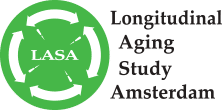Singing and making music
LASA filenames:
LASA103
Contact: Almar Kok
Background
Reading music and playing a musical instrument is a complex activity that comprises motor and multisensory (auditory, visual, and somatosensory) integration in a unique way, and therefore might maintain or improve cognitive function and mental well-being (Seinfeld et al. 2013; Wan & Schlaug, 2010;). Indeed, singing and making music has proven beneficial for mental health and cognitive performance (Kennaway, 2015) also in older adults (Seinfeld et al 2013; Hanna-Pladdy & Gajewski, 2012; Bugos et al. 2007). Among other leisure activities, playing musical instruments was associated with a reduced risk of dementia (Verghese et al. 2015). Thus far there is little research in this field.
Measurement instrument in LASA
A short questionnaire was constructed based on type and frequency of music making activity.
Questionnaires
LASAH103 / LASAI103 / LASAJ103 (self-administered questionnaire, in Dutch)
Variable information
LASAH103 / LASAI103 / LASAJ103
(pdf)
Availability of information per wave ¹
| B | C | D | E | 2B* | F | G | H | 3B* | MB* | I | J | K | ||
|---|---|---|---|---|---|---|---|---|---|---|---|---|---|---|
| Singing and making music | - | - | - | - | - | - | - | Sa | - | - | Sa | Sa | - | |
¹ More information about the LASA data collection waves is available here.
* 2B=baseline second cohort;
3B=baseline third cohort;
MB=migrants: baseline first cohort
Sa=data collected in self-administered questionnaire
Previous use in LASA
A study using the data from the H-wave found positive associations between making music and different aspects of cognitive functioning, including letter fluency, learning and short-term memory (Mansens, Deeg, & Comijs, 2017).
References
- Bugos JA, Perlstein WM, McCrae CS, Brophy TS, Bedenbaugh PH. Individualized piano instruction enhances executive functioning and working memory in older adults. Aging Ment Health. 2007; 11(4):464-71.
- Hanna-Pladdy B, Gajewski B. Recent and past musical activity predicts cognitive aging variability: direct comparison with general lifestyle activities. Front Hum Neurosci. 2012; 19(6):198.
- Kennaway J. Historical perspectives on music as a cause of disease. Prog Brain Res. 2015; 216: 127-45.
- Seinfeld S, Figueroa H, Ortiz-Gil J, Sanchez-Vives MV. Effects of music learning and piano practice on cognitive function, mood and quality of life in older adults. Front Psychol. 2013; 1(4): 810.
- Verghese J, Lipton RB, Katz MJ, Hall CB, Derby CA, Kuslansky G, Ambrose AF, Sliwinski M, Buschke H. Leisure activities and the risk of dementia in the elderly. N Engl J Med. 2003; 19, 348(25):2508-16.
- Wan CY, Schlaug G. Music making as a tool for promoting brain plasticity across the life span. Neuroscientist 2010; 16(5): 566-577.
- Mansens, D., Deeg, D.J.H., & Comijs, H.C. (2017). The association between singing and/or playing a musical instrument and cognitive functions in older adults. Aging & Mental Health, published online. doi.org/10.1080/13607863.2017.1328481
Date of last update: October 2, 2018
